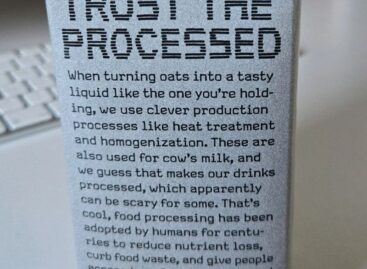Sustainability and health: the rise of plant-based dairy products in Hungary
In recent years, plant-based dairy alternatives have gained significant popularity not only globally but also in Hungary. Due to sustainability considerations, the demand for a healthy lifestyle and lactose sensitivity or milk protein intolerance, more and more consumers are choosing these alternatives. But why are these products considered the foods of the future, and what obstacles stand in the way of their spread? – this is the topic explored in the article by Agrárszektor.
 One of the most convincing evidences of the sustainability of plant-based dairy products is the drastic difference in the resources required for production, especially water and energy consumption. Approximately 41,000 liters of water are required to produce one liter of traditional cow’s milk, while only 142 liters are required for coconut milk. This water requirement is more than 280 times greater. In addition, the carbon dioxide emissions (CO₂ equivalent) generated during the production of one liter of milk are also significantly higher: while in the case of traditional milk production this is 1,273 grams, in the case of coconut it is only 114.48 grams.
One of the most convincing evidences of the sustainability of plant-based dairy products is the drastic difference in the resources required for production, especially water and energy consumption. Approximately 41,000 liters of water are required to produce one liter of traditional cow’s milk, while only 142 liters are required for coconut milk. This water requirement is more than 280 times greater. In addition, the carbon dioxide emissions (CO₂ equivalent) generated during the production of one liter of milk are also significantly higher: while in the case of traditional milk production this is 1,273 grams, in the case of coconut it is only 114.48 grams.
The differences in the ecological footprint also differ between individual plant-based raw materials, but in general it can be said that they are all much more environmentally friendly compared to traditional milk. Coconut, oats and almonds stand out with their low carbon and water footprint, even if the raw materials are transported from tropical or subtropical areas.
The popularity of plant-based drinks and dairy products is growing worldwide, and Hungary is no exception to this trend. In recent years, more and more domestic manufacturers have appeared on the market, trying to meet the diverse needs of consumers with a wide range of products. One of the biggest challenges is to make plant-based products as similar as possible to animal-based dairy products in terms of texture, taste and consistency. In the case of plant-based drinks, developments are progressing rapidly, and consumers already have an extremely wide choice. However, developing plant-based alternatives to other dairy products, such as cottage cheese or cheese, has been much more challenging. For example, the first plant-based cottage cheese was only released in 2021.
Innovation is key in the development of plant-based products. Consumers are increasingly looking for allergen-free products, which is why manufacturers are trying to use new raw materials instead of products containing soy, almonds or peas, for example. Although almond protein provides an excellent source of protein and creaminess, fewer and fewer people choose it due to its allergenic properties. As Gábor Szommer, commercial manager of Fino-Food Kft., also highlighted, technologists have much more freedom when developing plant-based dairy products than with traditional dairy products, which are strictly regulated by the Food Code.
Related news
Veganuary inspires millions of people in the UK
🎧 Hallgasd a cikket: Lejátszás Szünet Folytatás Leállítás Nyelv: Auto…
Read more >Every second German drinks plant-based
🎧 Hallgasd a cikket: Lejátszás Szünet Folytatás Leállítás Nyelv: Auto…
Read more >Related news
Festival buzz at the 60th anniversary EuroShop trade fair
🎧 Hallgasd a cikket: Lejátszás Szünet Folytatás Leállítás Nyelv: Auto…
Read more >









